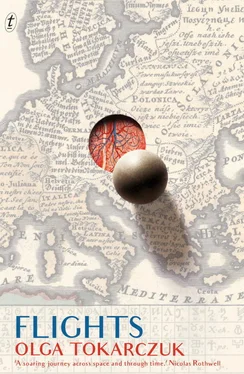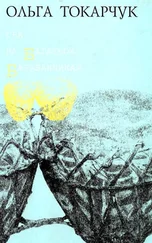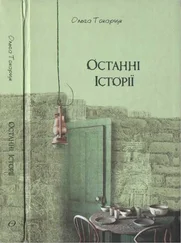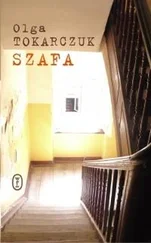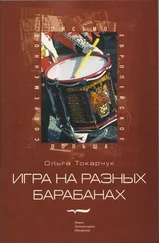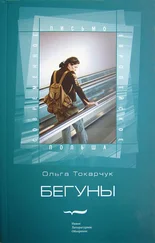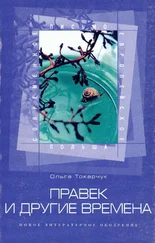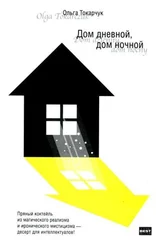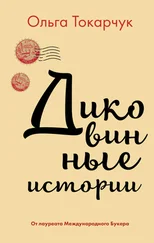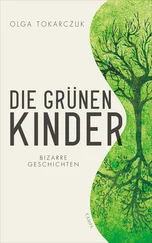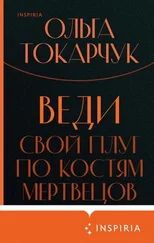But the crimson inner ocean of the professor’s head rose from the swells of blood-bearing rivers and gradually flooded realm after realm – first the plains of Europe, where he’d been born and raised. Cities disappeared underwater, and the bridges and dams built so methodically by generations of his ancestors. The ocean reached the threshold of their reed-roofed home and boldly stepped inside. It unfurled a red carpet over those stone floors, the floorboards of the kitchen, scrubbed each Saturday, finally putting out the fire in the fireplace, attaining the cupboards and tables. Then it poured into the railway stations and the airports that had sent the professor off into the world. The towns he’d travelled to drowned in it, and in them the streets where he had stayed a while in rented rooms, the cheap hotels he’d lived in, the restaurants where he’d dined. The shimmering red surface of the water now reached the lowest shelves of his favourite libraries, the books’ pages bulging, including those in which his name was on the title page. Its red tongue licked the letters, and the black print melted clean away. The floors were soaked in red, the stairs he’d walked up and down to collect his children’s school certificates, the walkway he’d gone down during the ceremony to receive his professorship. Red stains were already collecting on the sheets where he and Karen had first fallen and undone the drawstrings of their older, clumsy bodies. The viscous liquid permanently glued together the compartments of his wallet where he kept his credit cards and plane tickets and the photos of his grandkids. The stream flooded train stations, tracks, airports and runways – never would another airplane take off from them, never would another train depart for any destination.
The sea level was rising relentlessly, the waters swept up words, ideas and memories; the streetlights went out under them, lamp bulbs bursting; cables shorted, the whole network of connections transformed into dead spiderweb, a lame and useless game of telephone. Screens were extinguished. And finally that slow, infinite ocean began to come up to the hospital, and Athens itself stood in blood – the temples, the sacred roads and groves, the agora empty at this hour, the bright statue of the goddess and her little olive tree.
She was by his side when they made the decision to unplug the machine that wasn’t necessary now, and when the gentle hands of the Greek nurse covered in one deft motion his face with the sheet.
The body was cremated, and Karen and his children scattered the ashes into the Aegean sea, believing this to be the funeral he would have wanted.
I’ve progressed. At first, when I would wake up some place new, I’d think I was at home. It would take me a minute to make out the unfamiliar details, now disclosed by daylight. The heavy hotel drapes, the hefty TV set, my messy suitcase, the meticulously folded white towels. As a new place took shape beyond the curtains, wimpled, enigmatic, frequently cream-coloured or yellow still from the street lamps.
But then I entered into a phase that travel psychologists refer to as ‘I Don’t Know Where I Am’. I’d wake up totally disoriented. Like an alcoholic coming to, I would try to remember what I’d done the previous evening, where I’d been and how I’d got there, going over every detail in an effort to decipher the here and now. And the longer this procedure would take, the more I would panic – an unpleasant state, similar to labyrinthitis, the loss of basic balance, verging on nausea. Where in God’s name am I? But the world is merciful in its particularities, which would always steer me back in the right direction in the end. I’m in M. I’m in B. This is a hotel, this is my friend’s apartment, the guest room in the home of the N. family. Someone’s sofa.
This type of awakening was like getting my ticket stamped for the next part of my journey.
Then came a third phase, which travel psychology refers to as the key phase, the crowning phase. In this phase, whatever your destination might be, you are always heading in that direction. ‘It Doesn’t Matter Where I Am,’ it makes no difference. I’m here.
The planet’s witnessing the appearance of new creatures now, ones that have already conquered all continents and almost every ecological niche. They travel in packs and are anemophilous, covering large distances without difficulty.
Now I see them from the window of the bus, these airborne anemones, whole packs of them, roaming the desert. Individual specimens cling on tight to brittle little desert plants, fluttering noisily – perhaps this is the way they communicate.
The experts say these plastic bags open up a whole new chapter of earthly existence, breaking nature’s age-old habits. They’re made up of their surfaces exclusively, empty on the inside, and this historic foregoing of all contents unexpectedly affords them great evolutionary benefits. They are mobile and light; prehensile ears permit them to latch onto objects, or the appendages of other creatures, thus expanding their habitat. They started out in suburbs and rubbish heaps; it took them several windy seasons to reach the provinces and far-flung wilds. But by now they have occupied vast tracts of the globe – from gigantic highway junctions to winding beaches, from the abandoned lots of grocery shops all the way to the bony slopes of the Himalayas. At first glance they seem delicate, frail, but this is an illusion – they are long-lived, almost indestructible; their fleeting bodies won’t decompose for some three hundred more years.
Never before have we been faced with such an aggressive form of being. Some, in a kind of metaphysical rapture, believe it’s in the bags’ nature to take over the world, to conquer all continents; that they are pure form that seeks contents but immediately tires of them, throwing themselves to the wind yet again. They maintain the plastic bag is a wandering eye that belongs to some imaginary ‘there’, a mysterious observer taking part in the panopticon. Others, meanwhile, with their feet more firmly on the ground, assert that these days evolution favours fleeting forms that can flit through the world while at the same time attaining ubiquitousness.
Each of my pilgrimages aims at some other pilgrim; today I finally arrived. This other pilgrim was embedded in Plexiglass or, in the other rooms, plastinated. I had to wait my turn in line to see it, to drift along among these exhibits, beautifully lit, bilingually described. Arrayed before us, they resembled precious cargo brought from very far away, set out for the eye to feast on.
First I examined the carefully prepared specimens embedded in Plexiglass, little bits of the body, exhibits of screws and spans, cotter pins and soldered joints, of those often unappreciated smaller parts we don’t even remember exist. The method is sound – nothing can get in or out. If a war broke out, the mandible I had in front of me right now would most likely still survive, under the rubble, in the ashes. If a volcano erupted, if there was a deluge or a landslide, the archeologists of the future would rejoice in such a find.
But this is only the beginning. We pilgrims advanced in silence, in single file, those behind nudging those ahead. What do we have here, what’s next, what part of the body will we be shown now by these crafty plastinators, heirs of embalmers, of tanners, of anatomists and taxidermists.
A spine extracted from a body and stretched out in a glass case. Retaining its natural curvature, it looked like the Alien – a passenger travelling in a human body towards its destination, an enormous polypod. A Gregor Samsa assembled out of nerves and plexuses, fashioned from a rosary of little bones interwoven with blood vessels. We could say a prayer over it, at least, or lots of prayers, until someone finally took pity and permitted it to rest in peace.
Читать дальше
